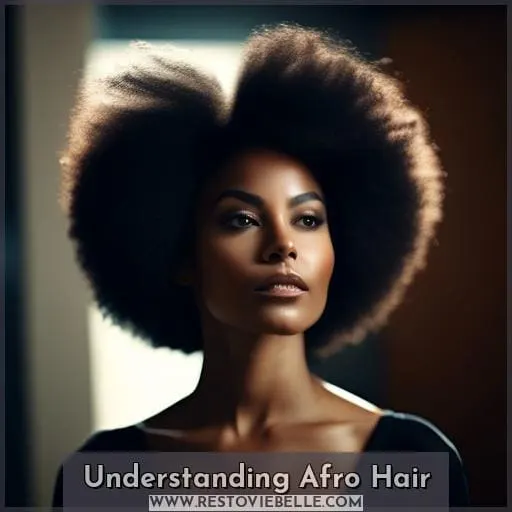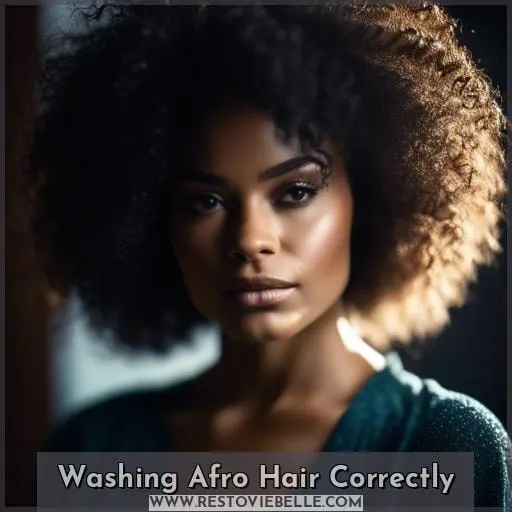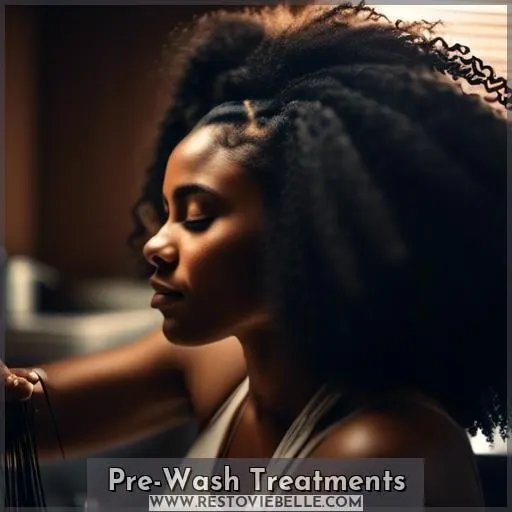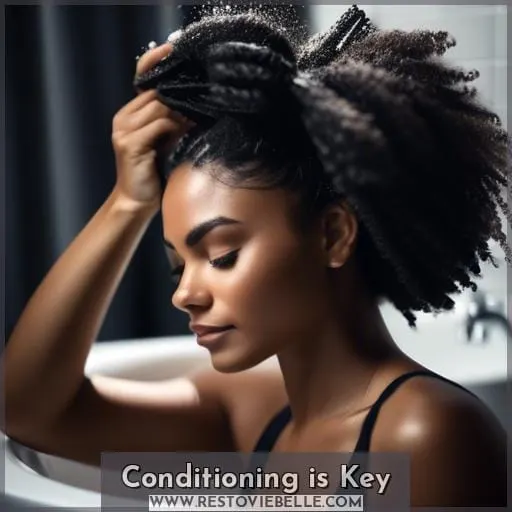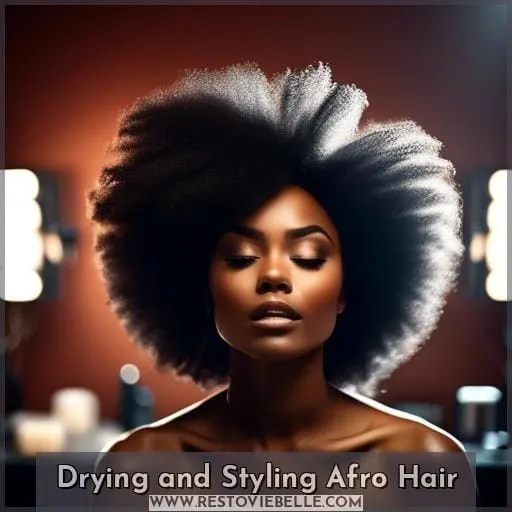This site is supported by our readers. We may earn a commission, at no cost to you, if you purchase through links.
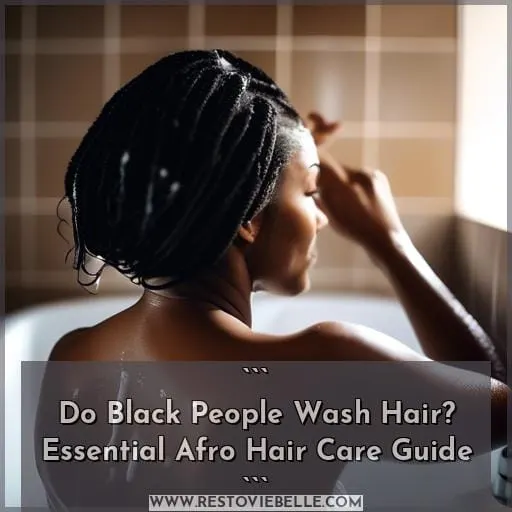 Discover the art of nurturing your crown with our essential guide on Afro hair care.
Discover the art of nurturing your crown with our essential guide on Afro hair care.
Afro hair, with its unique texture and curl pattern, demands a tailored approach to washing and maintenance. Contrary to widespread myths, black people do wash their hair, and doing so correctly is pivotal for its health and vitality.
This guide dives deep into understanding Afro hair’s distinct characteristics, debunking common misconceptions, and providing expert advice on washing frequency, selecting the right products, and mastering pre-wash treatments.
Embrace the journey of conditioning, drying, and styling your hair with techniques that protect and enhance its natural beauty. Whether you’re managing dryness, exploring co-washing, or balancing hair care with an active lifestyle, this guide is your roadmap to flourishing, healthy Afro hair.
Yes, black people do wash their hair, but not as frequently as those with other hair textures due to the dry nature of their hair. The recommended frequency is typically once every 7 to 14 days to prevent dryness and maintain hair health.
Table Of Contents
- Key Takeaways
- Understanding Afro Hair
- Washing Afro Hair Correctly
- Pre-Wash Treatments
- Conditioning is Key
- Drying and Styling Afro Hair
- Special Considerations
- Frequently Asked Questions (FAQs)
- How does the texture of afro hair affect the choice of hair care products?
- What are the best practices for maintaining scalp health in between washes for afro hair?
- How does the environment (humidity, pollution, etc.) impact the maintenance of afro hair?
- What are the recommended techniques for detangling afro hair to minimize breakage?
- Can diet and nutrition play a role in the health and maintenance of afro hair?
- Conclusion
Key Takeaways
- Afro hair should be washed every 7 to 14 days, using a gentle, sulfate-free shampoo to prevent stripping the hair of its natural oils.
- Washing with warm water is recommended to open the cuticles and remove debris, followed by a cold water rinse to seal in moisture and keep hair manageable and shiny.
- Pre-wash treatments with oils such as olive, coconut, or avocado can help prevent damage and maintain hair health.
- Regular conditioning, including deep conditioning and the use of leave-in conditioners, is essential for providing moisture and strength to Afro hair.
Understanding Afro Hair
You’ve probably heard a lot of talk about Afro hair and might be wondering about its care.
Let’s set the record straight: Afro hair is as diverse as the people who wear it, with a range of textures and curl patterns that require specific attention and expertise.
Whether you’re rocking tight coils or looser curls, understanding your hair’s unique needs is the first step to keeping it healthy and vibrant.
Unique Characteristics
Understanding your Afro hair’s unique characteristics is crucial for proper care and styling.
- Afro Hair Texture: Your curls may range from springy spirals to tight coils, each with its own charm and care needs.
- Sebaceous Glands Distribution: These oil-producing glands vary in activity across your scalp, influencing moisture levels and hair health.
- Hair Growth Patterns: While growth rates are similar across ethnicities, your curls’ shrinkage can mask true length gains.
- Protective Styling Options: Embrace styles like braids and twists to shield your hair from damage and retain moisture.
Common Myths Debunked
Let’s bust some myths about Afro hair care. You’ve probably heard that black hair doesn’t grow long or that it’s too tough to handle daily washing.
Black hair boasts incredible versatility and a spectrum of textures that can flourish with proper care. Hair growth potential isn’t limited by race; it’s about how you nurture your locks.
Protective styles like braids and weaves can be fantastic, but they must be done right to prevent hair damage. And while relaxed hair might seem easier to manage, it can hinder growth if not maintained correctly.
Washing Afro Hair Correctly
When it comes to washing your afro hair, it’s essential to find a balance that maintains the health and vitality of your hair and scalp.
Opt for a gentle, sulfate-free shampoo to cleanse without stripping away natural oils, and consider your lifestyle when determining how often to wash—typically every 7 to 10 days, or more frequently if you’re active.
Remember to use warm water to open the cuticles for effective cleaning and finish with cold water to seal in moisture and shine.
Frequency and Schedule
When crafting your washing schedule, consider your hair’s needs and the expert frequency guidelines.
Opt for shampoos recommended for their gentle, nourishing properties, avoiding harsh chemicals that lead to hair breakage.
Water temperature is crucial; start with warm water to open the cuticles and finish with a cool rinse to seal in moisture.
Pre-wash oil treatments can fortify your hair, preventing damage during washing.
Choosing the Right Shampoo
After establishing a washing schedule that suits your hair’s needs, the next step is choosing the right shampoo, a crucial element in maintaining the health and beauty of your hair. Opting for the right shampoo can make a world of difference, especially for Afro hair, which requires specific care to thrive.
- Sulfate-Free Shampoos: These are gentler on your hair and scalp, preventing the stripping of natural oils which are essential for keeping your hair moisturized and healthy.
- Clarifying Shampoos: Ideal for removing buildup from hair products, clarifying shampoos should be used sparingly to deep clean without over-drying.
- Moisturizing Shampoos: Infused with natural oils and butters, these shampoos help to add and retain moisture, a key factor in preventing breakage and promoting hair growth.
Water Temperature Tips
After selecting the right shampoo, it’s crucial to consider water temperature, as it can significantly impact your hair’s health.
Warm water is ideal for opening up the hair cuticles and pores on your scalp, ensuring a thorough cleanse. However, too hot can lead to scalp irritation and strip your hair of its natural oils.
On the flip side, cold water is beneficial for sealing the cuticles, locking in moisture, and adding shine to your hair after conditioning. Your hair type, length, and porosity play a role in determining the optimal temperature.
For instance, high porosity hair may benefit from cooler rinses to prevent moisture loss, while low porosity hair might require warmer water to better absorb moisture. Always be mindful of scalp sensitivity when adjusting temperature to avoid discomfort.
By mastering the balance between hot and cold water, you’ll promote hair vitality and maintain its natural luster.
Pre-Wash Treatments
Before you even think about lathering up, it’s crucial to give your hair the TLC it deserves with a pre-wash treatment.
Using oils like coconut, olive, or jojoba, you can create a barrier that helps your strands retain moisture during the washing process.
This step not only makes detangling a breeze but also fortifies your hair against breakage, setting the stage for a healthy wash day.
Importance of Oil Treatments
Before diving into the importance of oil treatments, let’s recap the essentials of washing your afro hair. You’ve learned the right frequency and the best shampoos to use, now it’s time to understand how pre-wash oil treatments can elevate your hair care routine.
Oil benefits your hair by providing essential nutrients and moisture, which are crucial for maintaining healthy and vibrant locks.
- Choose oils rich in vitamins and fatty acids, like coconut or castor oil.
- Warm oils slightly to enhance penetration and effectiveness.
- Apply oils to the hair and scalp using gentle massaging techniques.
- Consider DIY treatments for a personalized hair care experience.
- Store oils properly to maintain their potency and benefits.
Incorporating these steps into your regimen won’t only prepare your hair for washing but also ensure it remains strong, hydrated, and less prone to breakage.
Detangling Techniques
After nourishing your locks with oil treatments, it’s time to tackle detangling. This step is crucial to prevent breakage and maintain the health of your hair. When you’re ready to detangle, remember to approach your hair with the same care and attention you’d give to a delicate fabric.
| Step | Tool | Tip |
|---|---|---|
| 1 | Wide-toothed comb | Start at the ends and gently work your way up to avoid pulling. |
| 2 | Sectioning hair | Divide your hair into manageable sections for thorough detangling. |
| 3 | Leave-in conditioners | Apply to each section to provide slip and moisture. |
Wet brushing can be less stressful on your strands, so consider detangling during or after showering when your hair is damp. With patience and the right technique, you’ll keep your hair strong and resilient.
Conditioning is Key
Conditioning is essential for black hair care, ensuring moisture and strength.
Regular conditioning, deep treatments, and leave-in conditioners are key to maintaining healthy, vibrant hair.
Embrace the diversity of black hair textures with expert care and creativity to cater to a distinguished clientele.
Regular Vs. Deep Conditioning
Conditioning your hair is a non-negotiable step in your hair care routine, but it’s crucial to understand the difference between regular and deep conditioning. Regular conditioners are great for daily or weekly use, providing the slip you need to detangle and smooth the hair cuticle.
However, deep conditioning goes a step further, penetrating the hair shaft to repair, strengthen, and nourish your locks.
- Conditioner types: Regular conditioners for surface-level care, deep conditioners for intensive treatment.
- Leave-in products: Perfect for ongoing moisture and protection throughout the day.
- Hot oil treatments: A method to deeply nourish and restore shine to your hair.
- Protein treatments: Strengthen your hair’s structure, especially if it’s damaged.
- Hair masks: Offer a potent dose of nutrients and moisture for your hair’s health.
Leave-in Conditioners
After diving into the benefits of regular and deep conditioning, it’s time to talk about leave-in conditioners. These are a game-changer for maintaining scalp health and keeping your hair hydrated throughout the day.
They’re especially beneficial for those with natural hair, providing lasting moisture without weighing down your strands.
| Leave-In Conditioner | Benefits |
|---|---|
| tgin Miracle RepaiRx | Repairs and protects hair with biotin and black castor oil |
| Carol’s Daughter | Strengthens hair with natural ingredients like coconut oil and honey |
| MY BLACK IS BEAUTIFUL | Nourishes with coconut oil, honey, and turmeric |
| AS I AM JBCO | Promotes growth and moisturizes with Jamaican black castor oil |
| Daily Dose | Can improve dry scalp with ingredients like aloe vera and peppermint |
Drying and Styling Afro Hair
When it comes to drying and styling Afro hair, it’s crucial to employ gentle methods that maintain the hair’s integrity.
After washing, opt for air drying or use a microfiber towel to carefully blot your hair, avoiding any harsh rubbing that can lead to breakage.
When styling, consider protective styles like buns, cornrows, or twists. These styles not only look fabulous but also safeguard your hair from environmental stressors and minimize manipulation, promoting healthier growth.
Gentle Drying Methods
After conditioning, it’s crucial to dry your hair gently to maintain its health and vitality.
Air drying is the kindest method, allowing your locks to dry naturally without the stress of heat.
However, if you’re in a hurry, towel drying with a microfiber towel can gently remove excess water without causing friction that leads to breakage.
For those who prefer a quicker method, blow drying on a low heat setting or using a diffuser can speed up the process while minimizing damage.
Diffusing is especially beneficial for keeping your curls intact and reducing frizz.
Protective Styling Options
When it comes to protective styling, you’re not just safeguarding your hair; you’re embracing versatility and style. Protective styles like braids, weaves, wigs, and extensions are more than just fashion statements—they’re a form of self-care for your hair.
These styles minimize daily manipulation, promoting length retention and reducing breakage.
- Braids: A classic choice that ranges from micro to box braids, offering longevity and ease of maintenance.
- Weaves: Sewn into cornrows, weaves provide a full-coverage look and can be a great way to experiment with different lengths and textures.
- Wigs: The ultimate in versatility, wigs allow you to switch up your style without any commitment or stress on your natural hair.
- Extensions: Whether you opt for clip-ins or tape-ins, extensions add length and volume, blending seamlessly with your natural hair for a flawless finish.
Special Considerations
When considering the care of Afro hair, it’s crucial to recognize the balance between cleansing and maintaining moisture.
If you’re active, you might find that washing your hair more frequently helps manage sweat and build-up, but always opt for a sulfate-free shampoo to avoid stripping your hair of its natural oils.
Additionally, co-washing can be a beneficial practice for some, but be wary of product buildup and ensure you’re still using a cleansing agent regularly to keep your scalp healthy.
Co-Washing Benefits
After exploring gentle drying methods for your Afro hair, let’s delve into the world of co-washing—a technique that can be a game-changer for your locks. Co-washing, or conditioner-only washing, offers a myriad of benefits, especially for certain hair types.
If you’re someone with dry, curly, or wavy hair, co-washing can be particularly beneficial. This method involves skipping shampoo and using conditioner to cleanse your hair, which can lead to softer, more manageable strands.
It’s a practice that can help maintain your hair’s natural oils, leading to healthier, more vibrant curls.
When you co-wash, you’re also giving your hair a break from the harsh detergents found in many shampoos. These detergents can strip your hair of moisture, leaving it dry and prone to breakage. By using co-washing techniques, you’re gently removing buildup without compromising the integrity of your hair.
It’s important to select the right co-washing products that are formulated to cleanse as well as condition. The frequency of co-washing will depend on your individual hair needs, but it can range from once a week to several times, depending on your hair’s moisture levels and lifestyle.
Co-washing isn’t for everyone, though. If you have fine, straight hair or an oily scalp, you might find that co-washing weighs your hair down or doesn’t address scalp issues effectively. In such cases, incorporating a clarifying shampoo into your routine occasionally can help manage buildup and maintain hair health.
Remember, co-washing is all about understanding your hair’s unique needs and finding a balance that promotes optimal hair growth and vitality.
Exercise and Hair Care
Transitioning from the benefits of co-washing, it’s crucial to consider how exercise impacts your hair care routine. Engaging in physical activity doesn’t mean sacrificing the health or style of your afro hair.
- Embrace protective styles like braids or twists during workouts to minimize sweat contact and reduce tangles.
- Opt for moisture-retaining products post-exercise, such as leave-in conditioners, to combat dryness.
- Incorporate scalp care into your routine, using gentle cleansers to remove sweat and prevent dandruff without stripping natural oils.
- Choose the right accessories, like satin-lined caps or headbands, to protect your hair from breakage and maintain moisture.
- Limit the use of heavy products like extensions or excessive hairspray, which can weigh down your hair and impede scalp health.
By integrating these practices, you can enjoy the benefits of regular exercise without compromising the beauty and health of your afro hair.
Managing Dryness and Breakage
To combat dryness and breakage, prioritize moisture retention and gentle handling of your hair.
Deep conditioning is a must; it strengthens and hydrates, reducing brittleness.
Regular use of leave-in conditioners can also help maintain moisture levels.
Embrace protective styling to shield your hair from environmental stressors and minimize manipulation.
Frequently Asked Questions (FAQs)
How does the texture of afro hair affect the choice of hair care products?
Afro hair’s unique texture, with its tight curls and kinks, demands products that deeply moisturize and strengthen.
It’s more prone to dryness and breakage, so you’ll need rich, nourishing formulas that penetrate well to maintain health and vitality.
What are the best practices for maintaining scalp health in between washes for afro hair?
Nearly 50% of African American women report hair thinning or loss as a top concern.
To maintain scalp health between washes for afro hair, avoid heavy products that clog pores. Instead, opt for light, natural oils like jojoba or coconut to moisturize the scalp without buildup.
Regular scalp massages enhance blood circulation, promoting healthy hair growth.
Also, protect your hair at night with a silk or satin scarf to reduce friction and moisture loss.
How does the environment (humidity, pollution, etc.) impact the maintenance of afro hair?
Humidity can cause your afro hair to frizz and absorb excess moisture.
Pollution can lead to buildup and damage.
Protect your strands with anti-humectants and regular cleansing.
What are the recommended techniques for detangling afro hair to minimize breakage?
To unravel the knots of your crown with grace, think of your strands as delicate silk threads.
Begin by quenching their thirst; moisture is your golden key. Glide through with fingers or a wide-tooth comb, starting from the tips, ascending like a gentle breeze.
Embrace patience, section your hair like chapters of a story, ensuring each part sings with hydration and care. This dance of detangling, when done with love, keeps breakage at bay, letting your hair flow free and strong.
Can diet and nutrition play a role in the health and maintenance of afro hair?
Yes, your diet significantly impacts the health of your afro hair.
Providing essential nutrients like protein, biotin, and iron to promote strength, growth, and prevent breakage.
Conclusion
Imagine you’ve just unraveled a twist-out that’s left your curls perfectly defined and your confidence soaring.
Embrace the journey, and let your hair’s natural beauty shine, because yes, black people do wash their hair, and they do it with knowledge, care, and pride.

